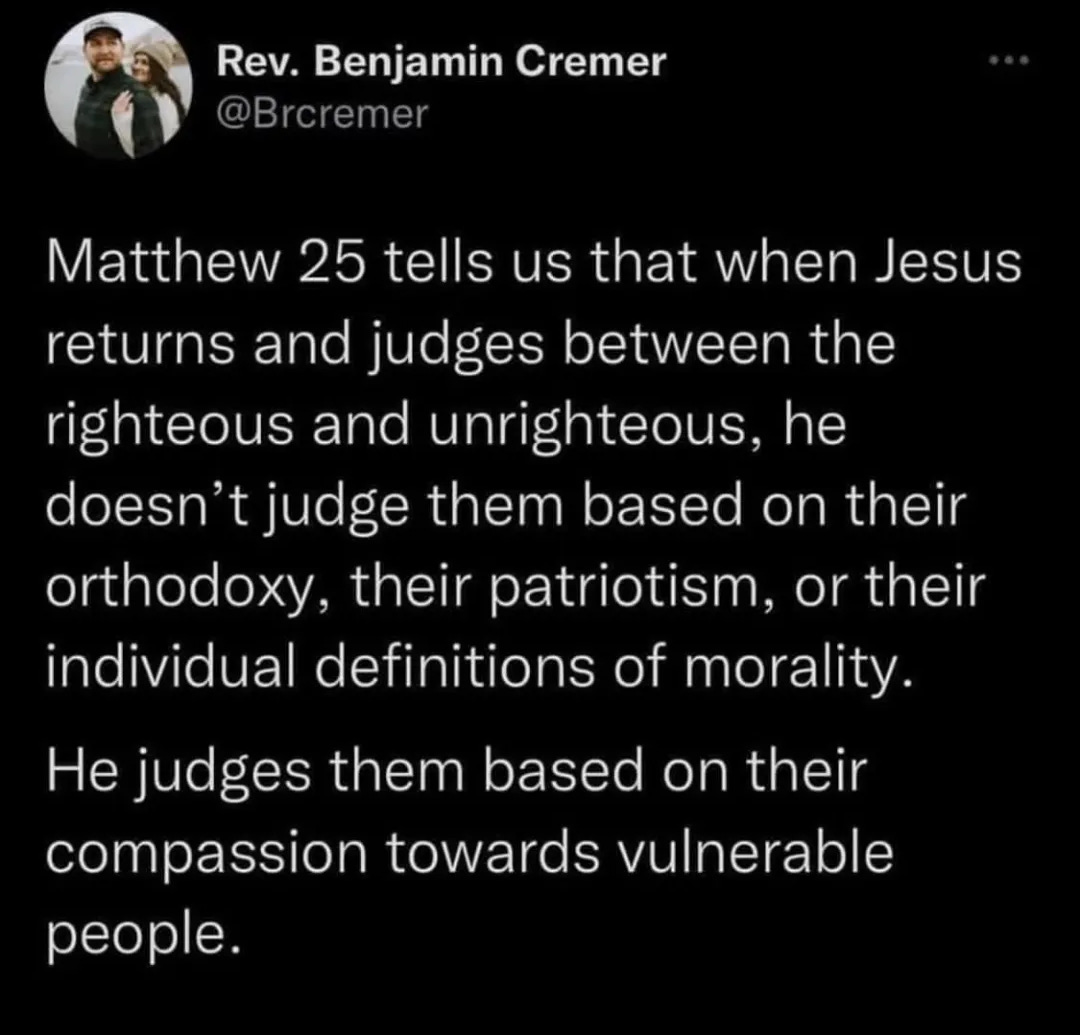The Way of Compassion vs The Way of Razor Wire
"Can Christianity Become a Religion of Loving-Justice?" series, Part 1
“You shall love your neighbor as yourself.’”
—Matt. 22:39b (NRSVUE)
So, this happened a little while back on my Threads feed (you can follow me there as “evolvingchristianfaith”).
If you do not know already, Texas has strung razor wire along the Rio Grande to prevent immigrants from entering the United States. Governor Abbott considers this a self-defense measure and therefore has judged this to be an appropriate response to people trying to cross the border.
Keep in mind Governor Abbot is a practicing Roman Catholic.
Quite frankly, if Abbot’s position on these issues is indicative of his “Christian” character, his version of being religious certainly seems like a “compassionless Christianity” to me.
“For the judgment you give will be the judgment you get, and the measure you give will be the measure you get.”
—Matt. 7:2 (NRSVUE)
The Christian way of compassion
Notice that the two quotes from the Gospel of Matthew above really say the same thing. One says you should do to others what you want done to you. The other says don't do to others what you don't want done to you.
At their core, they’re both about empathy.
When you start thinking about how others feel about situations and how they would like to be treated, it enables you to act in a way that prioritizes their health and well-being in your response.
In other words, empathy leads to compassion.
And, as Marcus Borg has noted “Compassion is the Holiness of God.” (I paraphrase because I can't remember which book this comes from. Maybe this?)
When we read the Gospels, they constantly remind us that the Way of Christ is the way of empathy and compassion. This Holy Way stands in contrast to the way of power and dominance that was typified by the Roman Empire at the time.
In fact, this contrast (the Way of Christ vs the way of Rome, or the Kingdom of God vs the empire of Rome) is a central, indispensable theme that runs through all the Gospel narratives.
It’s not that the way of power and dominance doesn’t make sense. It does. It’s grounded in our common human drive to survive, which is ultimately driven by fear. When we live in fear of others (especially those who are very different from us), we adopt defensive postures to protect ourselves.
When we live motivated primarily by love, however, things change. The posture of self-preservation transforms into self-giving. Self-centeredness turns into other-centeredness. Those who were once foreigners become family, and we treat them as such with compassion.
The Gospel is inherently political
God is love. This is the Christian Gospel.
Unfortunately, many Christians think that the Gospel is all about them as individuals. Basically, the belief goes like this…
Jesus loves me
Jesus saves me
It’s me and Jesus forever
On the bright side, that understanding of the Gospel does indeed emphasize God’s love for you. Yet, its extremely individualistic vision of love ultimately fails us. It has proven unable to see something critical, something that led Amos to say the following to the Israelites on behalf of God:
I hate, I despise your festivals,
and I take no delight in your solemn assemblies.Even though you offer me your burnt offerings and grain offerings,
I will not accept them,and the offerings of well-being of your fatted animals
I will not look upon.Take away from me the noise of your songs;
I will not listen to the melody of your harps.But let justice roll down like water
and righteousness like an ever-flowing stream.—Amos 5:21–24 (NRSVUE); emphasis mine
Yes, God is love, and justice is what love looks like in society.
That’s what the individualistic vision of “me and Jesus” love can’t see. It blinds itself to the higher Christian calling.
The proclamation of the Kingdom of God is inherently a denunciation of systems and power structures that would dare to neglect, marginalize, abuse, or harm in any way God’s children.
The very nature of the proclamation itself means that the Gospel of Jesus Christ is inherently political. Indeed, it is so political that I have to wonder…
If we proclaim a Gospel that isn’t political, can it even be considered the Gospel at all?
Diving into politics
This also recently happened on my Threads feed:
Yes. This “compassion towards vulnerable people” is exactly what justice is all about.
This month, I want to explore “Can Christianity Become a Religion of Loving-Justice?” Over the next 3 weeks, I’m going to highlight issues that I think need to be addressed as issues inherently related to the nature of the Gospel itself.
Unfortunately, there’s no way I can do a deep dive in this limited newsletter. Instead, I’m going to hit highlights, discuss why the issues are deeply concerning, and say what I think justice looks like in these situations.
I hope you decide to join me for the next few “Friday Stretches” (which, in case you missed it, is what the Friday newsletters are called).
Peace, Bo
www.evolvingchristianfaith.net
PS: If you found this article valuable, please hit the "like" button. The more likes I have, the more likely the post is to be found on Substack by others.
PPS: I would love to hear feedback on what you like about my newsletter and what I could do to make it better. To send me your thoughts, just reply to the email.
Support the Cause
My mission is to promote the progressive Christian voice in the spiritual/theological marketplace. I hope that by doing so I will help make the world a more loving place one newsletter at a time.
If you are not already a paying subscriber, I encourage you to consider it. It takes many (many) hours each week to create all the content for this project, and by becoming a paid subscriber you support the greater mission through me.
Will you consider becoming a financial supporter of the mission for only $6 per month? If so, I would greatly appreciate it.






